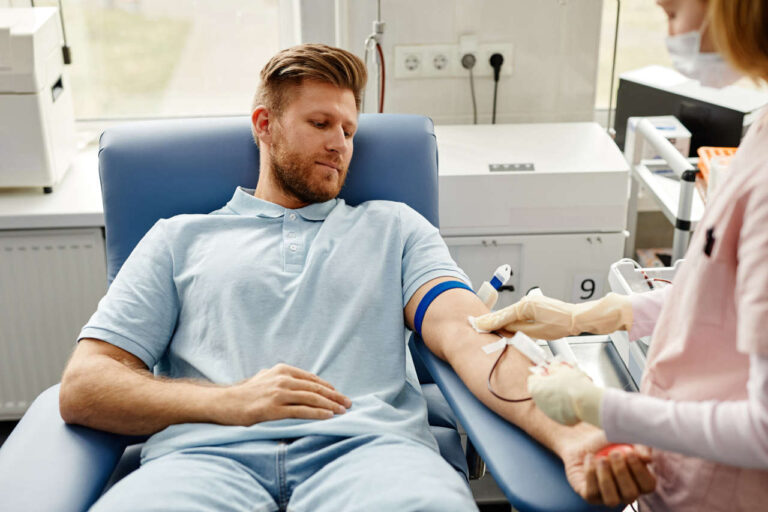
There’s a well-established link between IVIG and low blood pressure (hypotension). Though mild, hypotension can be life-threatening if it is associated with specific conditions, such as allergies, lung injuries, and infections.
Treatment Info | Get IVIG Prior Authorization
IVIG is an effective and well-tolerated treatment for many autoimmune and inflammatory disorders. Yet some users may experience undesirable symptoms during or after IVIG therapy. The most common IVIG side effects are:
- Headache
- Fever
- Chills
- Flushing
- Muscle or joint pain
- Tiredness
- Nausea
- Vomiting
- Rash
IVIG may cause hypotension in some users, typically within 4 hours after starting an infusion [1].
IVIG and Hypotension: Why Does IVIG Lower Blood Pressure?
While researchers know that IVIG can lower blood pressure in some users, they have yet to understand why it happens. Preliminary animal studies suggest it may have something to do with the immunoglobulin G (IgG) molecules in the IVIG preparation.
In 2003, German researchers reported that IgG molecules clump together to form a complex called an IgG dimer. According to them, these complexes bind with specific immune cells, causing these cells to release blood pressure-lowering substances [2].
In essence, the greater the quantity of these complexes, the greater the odds of hypotension.
Because these complexes form only in certain IVIG products, not all preparations lower blood pressure [3].
IVIG and Hypotension: When Alone, Low Blood Pressure Is Typically a Mild Reaction
IVIG-induced hypotension is usually mild and transient. Depending on the severity, your provider may recommend the following treatments:
- Change in the infusion rate
- Switching the IVIG preparation
- Supportive care, such as intravenous fluids and oxygen
- Medicines to raise blood pressure
If your condition does not improve or worsens, they may pause or terminate IVIG treatment.
IVIG and Hypotension: With Other Symptoms, Low Blood Pressure Can Be Life-Threatening
When you develop hypotension with other symptoms, it could be indicative of something serious. For example, hypotension is a common feature of a potentially life-threatening allergic reaction called anaphylaxis.
In this section, we will learn about the conditions that have hypotension as a feature.
Anaphylaxis

Some people may develop severe allergic reactions to an IVIG product or product components. Anaphylaxis symptoms (other than hypotension) include:
- Difficulty breathing
- Increased heart rate
- Swelling of the face or tongue
- Rash
- Itching
Acute Hemolysis
Hemolysis is when your red blood cells rupture faster than your body can replace them. In addition to low blood pressure, hemolysis can cause:
- Fever
- Difficulty breathing
- Red/brown/tea-colored urine
- Increased heart rate
- Back pain
Transfusion Related Acute Lung Injury (TRALI)
TRALI is a potentially fatal IVIG reaction. It occurs during or within 6 hours of infusion. Symptoms, besides hypotension, include:
- Rapid breathing
- Shortness of breath
- Fever
- Rapid heart rate
Bacterial Infection
Bacterial infections occur extremely rarely. Infection could result from contamination during IVIG administration. Symptoms include:
- High fever (during or up to 4 hours after IVIG infusion)
- Difficulty breathing
- Rapid heart rate
If you develop any of these conditions, your provider will first stop IVIG treatment. Then, they will give you condition-specific medicines. Medicines can include epinephrine, steroids, and allergy medications.
Supportive care, such as oxygen and respiratory support, may be necessary in some cases. The decision to resume infusion is case-specific. After reassessing your condition, your provider might switch to another IVIG preparation.
Get IVIG Copay Assistance | IVIG Financial Assistance
Can IVIG Cause High Blood Pressure?
Your blood pressure might get too high while you are on IVIG therapy. High blood pressure (hyPERtension) may cause headaches, dizziness, or blurred vision. If you think you have high blood pressure, talk to your provider immediately.
REFERENCES:
- Nguyen, Elizabeth et al. “Intravenous Immunoglobulin Infusion Reactions in Kawasaki Disease Patients Who Undergo Sedation.” The journal of pediatric pharmacology and therapeutics : JPPT : the official journal of PPAG vol. 25,3 (2020): 251-255. doi:10.5863/1551-6776-25.3.251
- Kroez, Monika et al. “Hypotension with intravenous immunoglobulin therapy: importance of pH and dimer formation.” Biologicals : journal of the International Association of Biological Standardization vol. 31,4 (2003): 277-86. doi:10.1016/j.biologicals.2003.09.001
- Bleeker, Wim K., et al. “Vasoactive Side Effects of Intravenous Immunoglobulin Preparations in a Rat Model and Their Treatment With Recombinant Platelet-activating Factor Acetylhydrolase.” Blood, vol. 95, no. 5, Mar. 2000, pp. 1856–61, doi:10.1182/blood.v95.5.1856.005k03_1856_1861.












